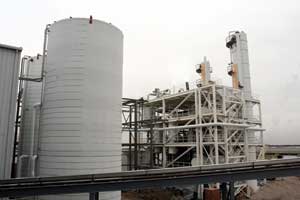Developers undeterred by E3 BioFuels bankruptcy

January 10, 2008
BY Susanne Retka Schill
Two integrated ethanol plant/cattle feedlot developers are undaunted by the recent filing of bankruptcy under Chapter 11 provisions by E3 BioFuels LLC in Mead, Neb.
For the most part, Growing Power Hairy Hill LP in Alberta is following the same closed-loop concept used by E3 BioFuels, said General Manager Mike Kotelko. "There are some different dynamics at [the Mead] plant in the ownership structure and also the integration of the technologies." GPHH is completing its third year of producing biogas for electrical power from an anaerobic digester colocated with the Highland Feeders Ltd. feedlot. Dirt work began this fall for a 40 million-liter-per-year (11 MMgy) ethanol plant and expansion of the biogas facility. "The strength of the operational model is in reducing operating costs of the ethanol plant and feedlot," Kotelko said. "We're intentionally keeping these as separate businesses."
Panda Ethanol Inc. is nearing the completion of its 115 MMgy ethanol plant in Hereford, Texas, which will gasify manure to provide heat for the ethanol production process. "We're not discouraged whatsoever," said Bill Pentak, director of corporate communications and investor relations, of E3 BioFuels' bankruptcy filing. "We're utilizing a different technology." Panda considered anaerobic digestion but decided that it would be unrealistic to build a digester large enough to power an ethanol plant designed to utilize economies of scale, he said.
E3 BioFuels was the first closed-loop ethanol facility that planned to convert manure in an anaerobic digester to power the ethanol plant, which in turn would provide distillers grains for the colocated feedlot supplying the manure. Construction of the 25 MMgy ethanol plant and anaerobic digester began in October 2005, and ethanol production began in April 2007.
E3 filed for Chapter 11 bankruptcy protection Nov. 30 with the U.S. Bankruptcy Court in Kansas City, Kan. In its announcement, the company said construction delays and mechanical failures delayed the start-up of the plant and prevented full production. "The deterioration of the ethanol market, coupled with the plant operating at materially less than full capacity, made the economics untenable and the reorganization allowed under Chapter 11 necessary," the company said.
"[If not] for the construction failures, we would have reached substantial completion months earlier, if not a year ago, and never would have been in Chapter 11," said company spokesman R.J. Wilson. "We've been told by the attorneys that these [mechanical] failures may be the subject of litigation." The company stressed that the science, the process and the patent supporting E3 have been proven successful.
The Chapter 11 filing will allow the company time to seek additional capital financing necessary to repair the ethanol plant, which was damaged during start-up, the company said. Wilson added, "We are progressing toward a reorganization plan with the court and creditors. This is a process, and we are committed to seeing it through."
For the most part, Growing Power Hairy Hill LP in Alberta is following the same closed-loop concept used by E3 BioFuels, said General Manager Mike Kotelko. "There are some different dynamics at [the Mead] plant in the ownership structure and also the integration of the technologies." GPHH is completing its third year of producing biogas for electrical power from an anaerobic digester colocated with the Highland Feeders Ltd. feedlot. Dirt work began this fall for a 40 million-liter-per-year (11 MMgy) ethanol plant and expansion of the biogas facility. "The strength of the operational model is in reducing operating costs of the ethanol plant and feedlot," Kotelko said. "We're intentionally keeping these as separate businesses."
Panda Ethanol Inc. is nearing the completion of its 115 MMgy ethanol plant in Hereford, Texas, which will gasify manure to provide heat for the ethanol production process. "We're not discouraged whatsoever," said Bill Pentak, director of corporate communications and investor relations, of E3 BioFuels' bankruptcy filing. "We're utilizing a different technology." Panda considered anaerobic digestion but decided that it would be unrealistic to build a digester large enough to power an ethanol plant designed to utilize economies of scale, he said.
E3 BioFuels was the first closed-loop ethanol facility that planned to convert manure in an anaerobic digester to power the ethanol plant, which in turn would provide distillers grains for the colocated feedlot supplying the manure. Construction of the 25 MMgy ethanol plant and anaerobic digester began in October 2005, and ethanol production began in April 2007.
E3 filed for Chapter 11 bankruptcy protection Nov. 30 with the U.S. Bankruptcy Court in Kansas City, Kan. In its announcement, the company said construction delays and mechanical failures delayed the start-up of the plant and prevented full production. "The deterioration of the ethanol market, coupled with the plant operating at materially less than full capacity, made the economics untenable and the reorganization allowed under Chapter 11 necessary," the company said.
"[If not] for the construction failures, we would have reached substantial completion months earlier, if not a year ago, and never would have been in Chapter 11," said company spokesman R.J. Wilson. "We've been told by the attorneys that these [mechanical] failures may be the subject of litigation." The company stressed that the science, the process and the patent supporting E3 have been proven successful.
The Chapter 11 filing will allow the company time to seek additional capital financing necessary to repair the ethanol plant, which was damaged during start-up, the company said. Wilson added, "We are progressing toward a reorganization plan with the court and creditors. This is a process, and we are committed to seeing it through."
Advertisement
Advertisement
Advertisement
Advertisement
Upcoming Events





